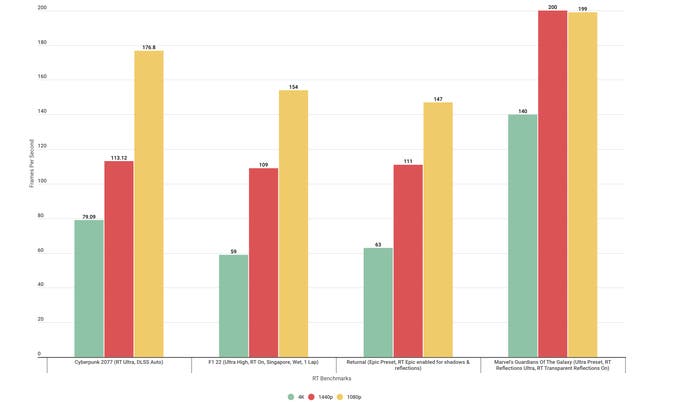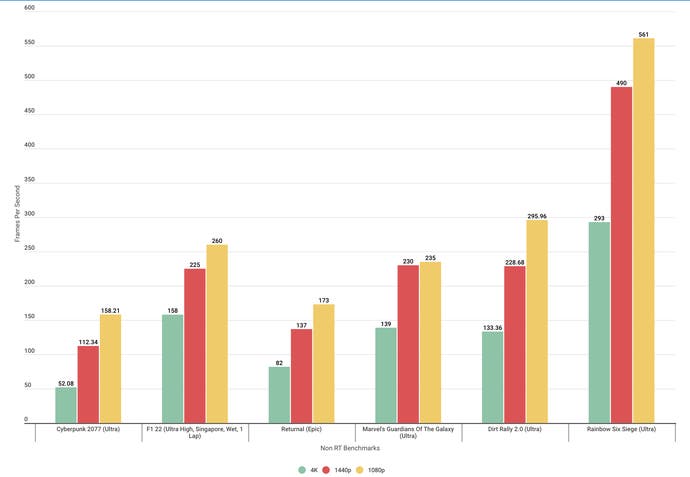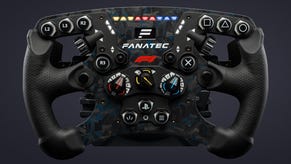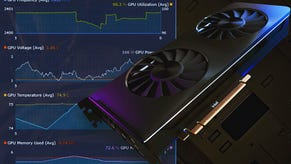Jumping in at the deep end: building a high-spec gaming PC as your first
Benchmarks: Cyberpunk 2077, F1 22, Returnal, Marvel's Guardians Of The Galaxy, Dirt Rally 2.0, Tom Clancy's Rainbow Six Siege
Now it was all built, it came down to benchmark time. For these, I selected six games to offer a range of high frame rate competitive titles, and more single-player oriented games to offer a mix of possible workloads.
With these games, I tested them with RT on and off, if RT was available, at the highest settings to push it as much as possible. To give you an idea of how it performs in different display specs, I also ran each test at three resolutions: 4K, 1440p and 1080p.
RT games
Cyberpunk 2077 remains a powerful benchmark for testing the latest components, with a beefy system needed to take advantage of its vivid detail, especially when enabling ray tracing. In this setup, with the RT Ultra preset selected (because Overdrive makes no sense in this scenario), and DLSS set to Auto, the system performed pretty well, with a 79fps average. In dropping down to 1440p, it's likely to be able to take advantage of the sea of high refresh rate QHD QD-OLED panels we're seeing with an average of 113fps, portraying the simple fact that this makes for quite a powerful set of components.
F1 22 may be more of a competitive racing title, but slap on some RT, and it becomes a seriously good-looking single-player title too. I noted this when I reviewed the console port a couple of years ago, but playing it on PC for the first time only proved this further. At 4K, we're getting a 59fps average on the challenging Singapore benchmark in the rain for one lap, while at 1440p, it's up to the dizzy heights of 109fps.

As with Cyberpunk, it was much the same story with Returnal, whose benchmark is perhaps one of the most complete out of games today. It's perhaps a more intense situation than the actual game itself, and offers a wide range of metrics after you're done to tell you where any bottlenecks were or what the limiting factor of your system is. For my testing, I used the game's top epic preset and enabled epic RT for both shadows and reflections. An average frame-rate of 63fps is pretty reasonable and allows for smooth gameplay, while dropping down to 1440p nearly doubled the frame-rate to 111.
My final choice was Marvel Guardian's of the Galaxy, a title whose benchmark seems to have gained a bit of a reputation for being quite CPU-limited. Nonetheless, this combo of parts powered through it at the RT ultra preset with ray-traced reflections set to ultra and ray-traced transparent reflections turned on. A result of 140fps at 4K was excellent, while 200fps at 1440p and a surprising 199fps at 1080p proves the point of this being a CPU-limited title.
Non-RT games
In turning ray tracing off and moving to pure rasterisation, while the 4080 isn't necessarily the best card in its price bracket - I'm looking at you, 7900 XTX - the combination of parts here still seemed to offer some excellent performance overall, with a couple more games thrown in for good measure.
As with before, Cyberpunk 2077 pushed my PC on its ultra preset, with it recording a result of 52fps at 4K, as well as 112fps at 1440p. It's a demanding game, but the combination of the 7800X3D and 4080 helped record some solid frame rate figures in the title's built-in benchmark.
With RT off, it becomes clear as to why F1 22 is an excellent choice for competitive racing, with my PC hitting a solid 158fps at 4K and 225fps at 1440p, with it being able to max out a 4K/144Hz panel and nearly hit top marks on a 1440p/240Hz option too.

Returnal, on its top Epic preset, managed 82fps at 4K in its especially demanding benchmark, while dialling back the resolution to 1440p caused a near-doubling up to 137fps.
Marvel's Guardians of the Galaxy offered remarkably similar results in the non-RT Ultra preset to its ray-traced performance with an average 139fps at 4K, as well as similarly limited results at both 1440p and 1080p with 230fps and 235fps respectively.
For my non-RT testing, I also chose a couple of different competitive games which should theoretically prove this PC's worth for higher-paced games. First up was Dirt Rally 2.0, one of my favourite rally games of the last few years, as well as being one that offers a competent full rally stage benchmark nestled within the game files. At 4K, my PC mustered a result of 133fps, with smooth and responsive gameplay, while at 1440p, a result of 229fps helps to max out the refresh rate of my 4K/240Hz monitor.
A final test was Tom Clancy's Rainbow Six Siege, a competitive shooter which actually has a proper built-in benchmark to use. Hooray for convenience! This once again proved the penchance of the 7800X3D and 4080 for offering a swift and snappy experience, with posted dizzying results of 293fps at 4K and 490fps at 1440p.
So, there you have it - a range of benchmarks that perhaps unsurprisingly prove that the combination of the best gaming CPU money can buy today and an excellent GPU for ray-traced 4K gaming allows for some solid results at 4K and 1440p. All that's left now is for me to wrap up.







